Following up on last week's activity, today we have 'Rock power: geothermal power simulations; modelling geothermal power sources – renewable or not?'
This activity uses a density can filled with gravel to model different forms of geothermal power source. Many more activities related to power sources can be found on our website.Monday 28 February 2022
Monday 21 February 2022
In memory of Chris King: Geothermal power from 'hot dry rocks'
With great sadness we inform you that Chris King died on 17th February. He was the originator and inspiration for Earthlearningidea. He will be greatly missed, especially by the Geoscience community across the world.
We shall continue publishing new activities, keeping Earthlearningidea active in his memory:
The new ELI today is 'Deep geothermal power from ‘hot dry rocks’: an option in your area? A discussion of potential for extracting ‘hot dry rocks’ geothermal energy locally'.
This activity considers the ‘hot dry rocks’ geothermal potential in the UK through an experimental commercial project in Cornwall.
Many activities about power supplies can be found in our Topics and Teaching Resources on the website.
Monday 14 February 2022
Amazing Planet at the ASE virtual conference
Join us on Saturday February 19th for AMAZING PLANET to be presented at the virtual ASE Conference. Two members of the European Geosciences Union (EGU), will present a quick-fire selection of activities from Earthlearningideas. These are designed to enable teachers to encourage a sense of wonder at Planet Earth among their pupils.
The session will introduce ten processes which take place inside the Earth. These will include 'Quake shake', showing in a few seconds how parts of Mexico City might topple over as the old lake bed upon which it is built liquefies under seismic shaking.
'Magnetic Earth' will demonstrate the Earth’s magnetic field with a Plasticine sphere and a Magnaprobe.
Aspects
of seven surface processes will be demonstrated, including 'Rock rattle
and roll', an enjoyable, noisy activity reproducing erosion by shaking
rock fragments in a plastic bottle.
Various ways of representing Earth processes using your fingertips will also prove to be a fun way of learning principles such as the Rock Cycle.
The session is intended as a rapid introduction to the activities, of which there are now 384 freely available on the website. Each activity consists of one or two illustrated pages describing how to carry it out, with another page or two of the rationale for teachers.
Monday 7 February 2022
What to do with high-level radioactive nuclear waste?
The new ELI today continues our series of activities about how to reach 'net zero' emissions targets. 'Nuclear waste disposal; investigating geological disposal facilities (GDFs)'.
This activity explores geological disposal facilities (GDFs) as a solution to the problem of what to do with high-level radioactive nuclear waste?
Many other activities in the series can be found here.




